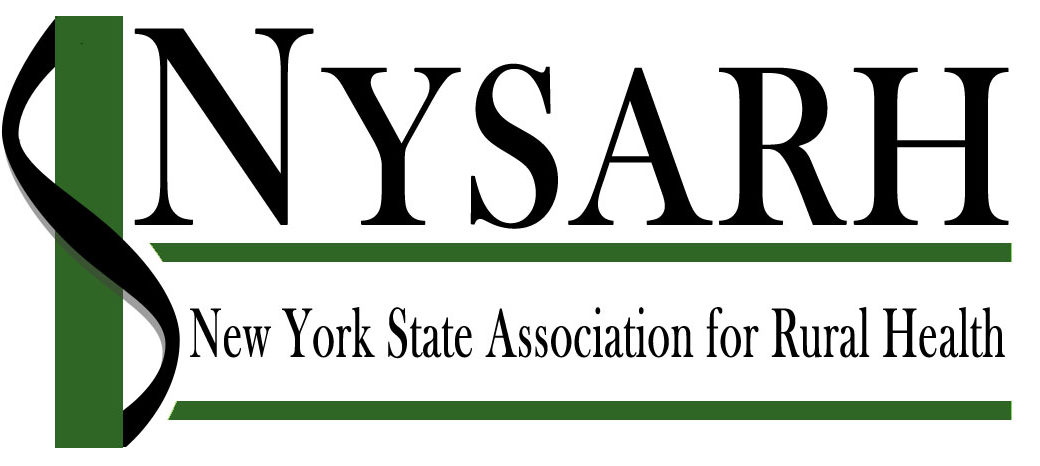2019 NYSARH Conference
Session and Workshop Presentations
- Rural Workforce Future in New York State: Challenges and Opportunities
Robert Martiniano
Dr. Robert Martiniano, Senior Program Manager at the Center for Healthcare Workforce Studies (CHWS), lead this important session on rural workforce issues including an overview of current workforce trends, changes in licensing or educational requirements, understanding the use of federal shortage designations, and the use of service obligated programs for recruitment and retention. CHWS – established in 1996 – is an academic research center based at the School of Public Health on the Health Sciences Campus at the University at Albany, State University of New York. CHWS’s mission is to provide timely, accurate information and conduct policy-relevant research about the health workforce. - Comparative Review and Update on Rural Health Systems Models
David Beauregard, Scott Carroll
This presentation reviewed the current return on investment that New York State has achieved in rural health, business, regulatory and policy challenges and the status of rural hospital affiliations and related outcomes. We will compare our observations to experiences in other states and review possible structural models going forward. - Opioid Task Force/Collaborative Strategies for Addressing the Opioid Crisis in a Rural Community
Allison Parry-Gurak, Steven Kelley, Ashima Butler
Genessee-Orleans-Wyoming Opioid Task Force: A Rural Tri-County Collaboration to End the Opioid Crisis
The goal of the Genesee-Orleans-Wyoming (GOW) Opioid Task Force was to address the growing opioid crisis across our rural tri-county area. Throughout this presentation, participants will learn how three rural communities came together to address this deadly crisis and discuss what efforts have been made thus far.Collaborative Strategies for Addressing the Opioid Crisis in a Rural Community
Collaboration between a Critical Access Hospital and community based organizations to offer MAT to overdose patients that were revived with Naloxone and brought to the ED. The pilot project team has developed operational processes for screening and connectivity to treatment. - Overcoming Rural Competitive Disadvantage
John C. Salo, Emma Nalin
This workshop presented strategies for overcoming the competitive disadvantage faced by rural and small organizations that want to participate in value-based payment. Presenters outlined Rural Health Network of South Central New York’s current work to improve measurement and demonstrate Return on Investment for social determinants interventions and invited discussion around opportunities for advocacy and policy change. - The Future’s So Bright, I Gotta Wear Shades
Sean Ossont, Christopher Harris
The tightrope upon which stability balances in community-based organizations is being stretched taut, as the role of the CBO is extended to new levels. Governments continue to delegate further responsibility to CBOs and rely on them to deliver more with less. CBOs are the warehouse and gatekeepers of local information, obviously valuable for their own purposes, but this data is also useful to other organizations and government agencies. A few CBOs have evolved into organizations of knowledge management. Given constrained budgets,workforce challenges and new demands of service, technology and the data it supports is increasingly becoming more important to manage daily business operations, develop innovative solutions, negotiate contracts and create evidence-based grant opportunities. - Using Social Media to Tell Your Story
Mandy Qualls
Social media is ubiquitous in today’s society. If we’re not telling our stories by harnessing the power of social media to work for us, who is? - Recruiting Medical Students to Rural Health on a Shoestring Budget
Gertrude O’Sullivan, Rob Wingate
Program partners in two states are working together to create a pipeline of physicians to areas that will face shortages in primary care and specialty providers. This sustainable model was created with no budget and has been met with enthusiasm by future doctors. Rural community members, four medical schools and a variety of health care providers/facilities in CT and NY have partnered to create a summer rural immersion experience that features exposure to both health care delivery and quality-of-life components. Hear directly from the coordinators about how to replicate this program elsewhere and important tips to make your physician recruitment efforts successful and affordable. - Panel: Rural Veterans’ Services
Sponsored by National Rural Health Association
Carolyn Turvey, PhD., Derek Coy, MA., Nicole Costa, LCSW, Richard Kazel, FACHE
This session will provide information about the Veterans Health Administration, America’s largest integrated health care system, providing care at 170 medical centers and 1,074 outpatient sites, serving 9 million enrolled Veterans each year. In 2019, Congress passed the MISSION Act, which increases veterans’ access to approved non-VA medical providers in their communities. Panelists will focus on behavioral health services.
